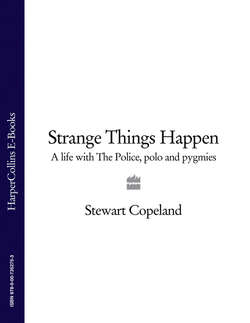Читать книгу Strange Things Happen: A life with The Police, polo and pygmies - Stewart Copeland - Страница 9
1973
COLLEGE
ОглавлениеIt turns out that life can be lived in almost constant sunshine. The surfers of Southern California can hardly imagine any other kind of life. Everybody here in Ocean Beach is so laid-back that I feel like I’m stuck in permanent fast-motion. I’m not used to this relentless ease. Don’t these people realize there is Cold and War and Want in the world? I have been “American” all my life, but this is effectively the first time that I’ve actually been here. My daddy took us off to Egypt when I was two months old. From out there in the world people are watching America, but America is not watching them. So it turns out that I’m kind of a foreigner here, too. I’m getting used to being the guy in differently shaped jeans.
Every other day I head downtown to the San Diego School of Performing Arts for piano time and composition classes. The music department takes up the bottom half of the stately old building. The music students are the usual nonsporty stick-insect types, but compared to the theater and ballet geeks, we are like raging bulls in the basement.
In the piano rooms I’m conjuring music that has gone way beyond what I can actually play with my hands. In fact my intelligent designer omitted to give me the gift of pianitude. I did get the genes for stringed instruments and mallets (guitars and drums), which I find naturally easy to play, but my fingers just don’t do keyboards. No matter how many hours, years, or decades I spend composing on the keyboard, my hands just can’t find their cunning.
I can find the notes that my head dictates and check them against one another to build harmony, but I can’t play them in rhythm. I can play the rhythm of the notes I want but can’t find the pitches fast enough. I can play my music with good rhythm and wrong notes or with correct pitches and no rhythm.
At least back home in London, my dad’s Beocord open reel recorder allowed me to record two parallel tracks of guitar. On the left track I could record the rhythm chords, and then on the right track I could record an accompanying tune. Then came the trance of listening to my music while my hands lay idle. There is no greater glow of narcissistic validation than receiving my own art. I slay myself—always have and hope I always will.
Here in California I’m a college kid tangled up and yearning for the mysterious golden girls, but that glow of validation is dim. I can strum on my guitar, but there is bigger stuff raging around in my head. I’m not even a professional musician yet, but I’m already dreaming up concept albums. In the piano rooms I can try to work things out on paper, but I can’t love my music by looking at it on the page. I just have to sing it in my head and let it go by.
In class I’m kind of the runt of the litter, again. Almost all of the other composition students are pianists from the other side of the universe. In fact, music study has always been of music that has never attracted me. Music classes cured me of Mozart, and my father cured me of jazz—meaning that I’m immune to the charms of both. The music that I do listen to doesn’t exist here in music school.
Dr. Mary K. Phillips is at the piano playing our homework. All of us geeks are twitching as she points out the mistakes of voicing and spelling. The assignment was to write sixteen bars of fourpart harmonic composition observing the rules of figured bass. As a practical matter I have always found that the rules could only be applied as a retrofit. The music comes out of my brain and lands in the material world—and then I can figure out what rules apply. So my sixteen bars derive from some larger opus of the piano room that have been retrofitted with the rules of Dr. Phillips’s class.
The focus of the group is the mechanics of harmony. The other student pieces sound like they are supposed to sound, like pale Mozart, and no one seems to mind that they are meaningless sequences of chords. The point is to grasp the laws of harmonic movement.
When she gets to my piece she plays it down like a breeze, and I’m basking in the beauty of hearing it for the first time as a listener, without having to limp through playing it myself. But I know that she will crush me with the inevitable technical errors. When she reaches the end the room is unusually silent. She turns to me and says:
“Stewart, you have parallel fifths in measures three, seven, and eleven, but more important, this is actual music. You have a voice.”
Well, that may seem like faint praise, but it puffed me right up. Some part of the feverish grandiose exultation that I get from my own music is actually discernible to a dispassionate ear! Some part of the voodoo actually works.
She was right about those sixteen bars that I wrote for her homework assignment. They stuck in my head and eventually even reached my fingers. I could play that string of expertly voiced chords together with a scrap of lyric, and a few years later record it with The Police. The song was called “Does Everyone Stare the Way I Do?” I imagine the royalties from just that one song—flagged by Dr. Mary K. Phillips—must have paid off all my years of music education.
